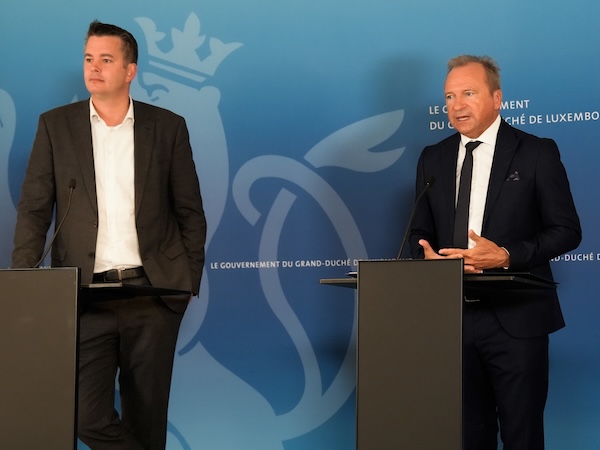 (L-R) Lex Delles, Luxembourg Minister of the Economy, SMEs, Energy and Tourism; Luxembourg Minister of Finance, Gilles Roth;
Credit: MECO
(L-R) Lex Delles, Luxembourg Minister of the Economy, SMEs, Energy and Tourism; Luxembourg Minister of Finance, Gilles Roth;
Credit: MECO
On Thursday 2 October 2025, Luxembourg’s Minister of Finance, Gilles Roth, and Minister of the Economy, SMEs, Energy and Tourism, Lex Delles – both responsible ministers for the Société Nationale de Crédit et d’Investissement (SNCI) – announced the launch of the Zero Interest Competitiveness/Sustainability Loan (PCP).
According to the Ministry of Finance and the Ministry of the Economy, the Competitiveness/Sustainability Loan is a new financial instrument designed to strengthen the long-term competitiveness and resilience of Luxembourg companies and is aimed primarily at SMEs for all types of projects that contribute to their competitiveness and sustainability. Larger companies may also benefit in the context of projects linked to digital and ecological transition.
The scheme is being implemented in close cooperation with SNCI’s partner intermediary banks Spuerkeess (Banque et Caisse d'Épargne de l'État - BCEE), Banque Internationale à Luxembourg (BIL), BGL BNP Paribas, Banque Raiffeisen and Banque de Luxembourg.
The ministries said the PCP provides stable and affordable financing, free of interest charges (within the framework of the European “de minimis” regime) and is complementary to financing from intermediary banks. The PCP has been structured to supplement commercial bank financing by acting as a catalyst to unlock additional resources for businesses, while minimising administrative formalities, since applicants do not have to complete an additional file. The instrument offers a co-financing rate by SNCI of up to 80% and €200,000 per project. The duration of an SNCI PCP loan may be a maximum of ten years. The commercial bank finances at least 20% of the project and supports its client during the application process.
Minister Delles stated: “Our companies, and above all our SMEs, are facing growing challenges in an increasingly complex environment. This new instrument is designed to give them the means, in particular SMEs, to invest with confidence in forward-looking projects.” He added: “The PCP will make it possible to carry out sustainable, high-impact investments in the digital and green transition, while ensuring accessible and practical support without adding extra administrative procedures.”
Minister Roth noted: “I welcome the introduction of this instrument by SNCI in collaboration with commercial banks in the financial centre. The PCP will act as a trigger for additional bank financing, enabling companies to pursue key projects regardless of their stage of development. Moreover, the PCP can be combined with other existing SNCI instruments, particularly for larger-scale or capital-intensive projects.”








